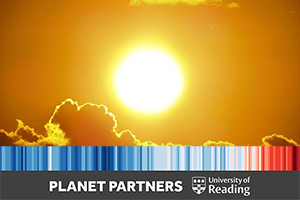#PlanetPartners: UN reports should prioritise less likely but high-impact events
18 October 2019

Climate scientists need to spend more time considering all plausible future climate scenarios rather than just the most likely, a leading climate scientist has argued.
In a new paper published in the Bulletin of the American Meteorological Society, Professor Rowan Sutton, climate scientist at the University of Reading and NCAS, says that scientists have not paid enough attention to two important issues: the current risks due to climate change, and the low-likelihood high-impact events which carry the highest risks.
These types of events are important for decision-makers, who think of climate change in terms of risk-management and risk-assessment. Risk-assessments place equal importance on how likely certain events are and what impacts they could have, yet many climate assessments have placed emphasis on predicting the likelihood of future climate scenarios, and only later considered impact.
Professor Sutton advocates for the Intergovernmental Panel on Climate Change (IPCC) to learn from risk-assessment methods. He says this would help scientists meet the needs of decision-makers in government, business and society.
Professor Sutton said: “The impact of major, albeit rare, climate events occurring is a key issue for decision-makers, so we must put their needs first. In order to develop robust adaptation strategies, decision-makers need to know how bad it could be and what to avoid.
“We insure our homes against fire not because we think it will happen but because the potential loss is so great. Scientists must take the same approach to climate change events and provide information on worst case scenarios that would have the greatest impact, even if they are unlikely to occur.”
The IPCC is divided into three groups, each responsible for looking at one aspect of climate change. The seven University of Reading scientists named as authors in the IPCC’s fifth assessment report last year made it the joint most represented institution globally in Working Group 1, and the most represented UK institution across all of the working groups.
Working Group 1 tackles the physical science behind climate change, and it is this group of experts in particular who Professor Sutton believes can do more to quantify the risks of future climate change.
Scientists in Working Group 1 have tended to focus on trying to reduce uncertainties in climate projections, helping to predict the likelihood of future events. On the other hand, Working Group 2 have been designated responsibility for assessing the impacts of changes to our climate.
However, Professor Sutton argues that drawing boundaries between each group of experts has prevented the IPCC from taking a holistic view of the challenge presented by climate change, and this approach is at odds with the principles of effective risk assessment.
To remedy this, Professor Sutton proposes that Working Group 1 focus on informing risk-assessments by identifying a broad range of possible future scenarios within our climate system, not only those that are most likely. Physical scientists should also pay more attention to quantifying impacts, in collaboration with Working Group 2. This work would essentially create a set of different ‘storylines’ for our future, which decision-makers could use to develop more robust adaptation and mitigation strategies.
